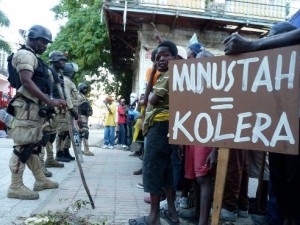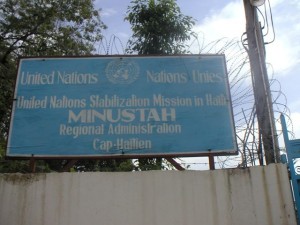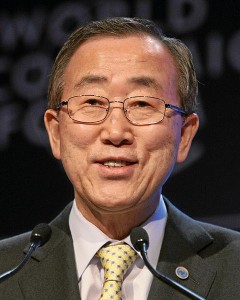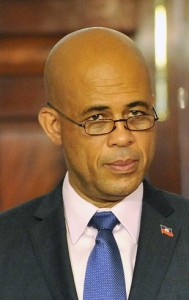Tag: un
Why the U.N. Should Take Responsibility for Haiti’s Cholera Outbreak
by Celso Perez and Muneer I. Ahmad, originally posted at The Atlantic
Despite much evidence to the contrary, for nearly three years, the United Nations has categorically denied that it introduced cholera into Haiti after the country suffered a devastating earthquake in 2010. Since then, cholera has killed more than 8,000 people and infected more than 600,000, creating an ongoing epidemic. As new cases continue to emerge, and the U.N.’s legitimacy continues to erode, it is time for the organization to apologize and take responsibility for the consequences of its actions and its inaction.
In a new report, Peacekeeping Without Accountability, which was released Tuesday, members of the Transnational Development Clinic at Yale Law School (YLS) and the Global Health Justice Partnership, an initiative of YLS and the Yale School of Public Health, provide scientific evidence showing that the U.N. brought cholera to Haiti and argue that the organization’s refusal to hold itself accountable to the Haitian people is both immoral and illegal. As we detail, international law, including the U.N. Charter, human rights treaties, and status-of-forces agreements (SOFAs), requires that the U.N. provide individuals affected by its peacekeeping operations with mechanisms for bringing claims against the organization. The failure to provide remedies in Haiti is part of a recent pattern of the U.N. neglecting its legal and moral responsibilities in peacekeeping operations worldwide. A continued refusal would further undermine the organization’s claim to promote the rule of law and human well-being in its missions.
Continue reading Why the U.N. Should Take Responsibility for Haiti’s Cholera Outbreak
In the News: UN Chief Tells US it Will Combat Cholera in Haiti
by Edith M. Lederer, Associated Press.
 UNITED NATIONS (AP) — Secretary-General Ban Ki-moon told members of the U.S. Congress Friday that the United Nations is committed to helping Haiti overcome a cholera epidemic even though it is refusing to pay compensation to victims who blame U.N. peacekeepers for starting the outbreak.
UNITED NATIONS (AP) — Secretary-General Ban Ki-moon told members of the U.S. Congress Friday that the United Nations is committed to helping Haiti overcome a cholera epidemic even though it is refusing to pay compensation to victims who blame U.N. peacekeepers for starting the outbreak.
Health officials say more than 657,000 people have fallen ill and more than 8,000 people have died from cholera since it was likely introduced to Haiti by U.N. troops from Nepal in 2010. More than 30,000 people have fallen ill and 440 have died in the neighboring Dominican Republic.
Ban was responding to a May 30 letter from U.S. Rep. Maxine Waters, a California Democrat, and 18 other Congressional “friends of the people of Haiti” who expressed concern at the U.N.’s rejection of the claims by 5,000 cholera victims and their families.
Continue reading In the News: UN Chief Tells US it Will Combat Cholera in Haiti
In the News: Accused of Sexual Abuse, MINUSTAH Officer Flees Haiti
Originally posted at CEPR.
 In February, the United Nations confirmed that a Canadian serving with the United Nations Police contingent of MINUSTAH had been accused of sexually and physically assaulting a Haitian woman. Yesterday, Marie Rosy Kesner Auguste Ducena, a lawyer with the Haitian National Human Rights Defense Network, told CBC news that, though the victim reported the assault to police, “nothing will happen… Women who will go to complain, you will see that maybe somebody will take the complaint and will say to her you will be called after. But in fact, the case will just be closed.” CBC notes that the “day after the incident, the man boarded a flight back to Canada, where he remains.”
In February, the United Nations confirmed that a Canadian serving with the United Nations Police contingent of MINUSTAH had been accused of sexually and physically assaulting a Haitian woman. Yesterday, Marie Rosy Kesner Auguste Ducena, a lawyer with the Haitian National Human Rights Defense Network, told CBC news that, though the victim reported the assault to police, “nothing will happen… Women who will go to complain, you will see that maybe somebody will take the complaint and will say to her you will be called after. But in fact, the case will just be closed.” CBC notes that the “day after the incident, the man boarded a flight back to Canada, where he remains.”
This is but the latest in a series of sexual abuse allegations leveled against MINUSTAH personnel in Haiti. According to U.N. data, since 2007 there have been 70 allegations of sexual abuse and exploitation against MINUSTAH members, but as CBC news points out, “not one has ended up in a Haitian court.”
Continue reading In the News: Accused of Sexual Abuse, MINUSTAH Officer Flees Haiti
In the News: UN will not compensate Haiti cholera victims, Ban Ki-moon tells president
by Rashmee Roshan Lall and Ed Pilkington. Originally posted at The Guardian

photo by the World Economic Forum
The UN has taken the rare step of invoking its legal immunity to rebuff claims for compensation from 5,000 victims of the Haiti cholera epidemic, the worst outbreak of the disease in modern times and widely believed to have been caused by UN peacekeepers importing the infection into the country.
Citing a convention laid down in 1946, the UN secretary general, Ban Ki-moon, telephoned President Michel Martelly of Haiti to tell him that the UN was not willing to compensate any of the claimants. The epidemic has killed almost 8,000 people and stricken hundreds of thousands more – about one out of every 16 Haitians.
For the UN to claim immunity for a crisis that most experts are convinced it unwittingly caused through its own disaster relief mission is highly contentious. The infection is thought to have been carried into Haiti by UN peacekeepers from Nepal sent to help with disaster relief following the 2010 Haiti earthquake.
In the News: Still waiting for recovery
Originally posted at The Economist
Three years after a devastating earthquake, the “Republic of NGOs” has become the country of the unemployed
 “HAITI is open for business”, Michel Martelly, the country’s president since May 2011, likes to proclaim. His government has backed up this talk by making it easier for foreigners to own property and by setting as a goal that Haiti climb into the top 50 countries in the World Bank’s ranking for ease of doing business (it now comes 174th out of 185). In November the president opened a gleaming arrivals hall at Toussaint Louverture airport. Mr Martelly himself is in such constant motion abroad—courting donors and investors, he says—that his peregrinations and the per diems alleged to be associated with them have become a source of mordant jokes.
“HAITI is open for business”, Michel Martelly, the country’s president since May 2011, likes to proclaim. His government has backed up this talk by making it easier for foreigners to own property and by setting as a goal that Haiti climb into the top 50 countries in the World Bank’s ranking for ease of doing business (it now comes 174th out of 185). In November the president opened a gleaming arrivals hall at Toussaint Louverture airport. Mr Martelly himself is in such constant motion abroad—courting donors and investors, he says—that his peregrinations and the per diems alleged to be associated with them have become a source of mordant jokes.
But gangbuster growth, hoped for as the country rebuilds itself after the earthquake of January 12th 2010 that wrecked the capital, Port-au-Prince, and killed tens of thousands of people, has failed to materialise. In the 12 months to the end of September the economy expanded by a modest 2.5%. It was the second year of dashed expectations: the IMF had forecast growth of 8% in both 2011 and 2012.
In this section
